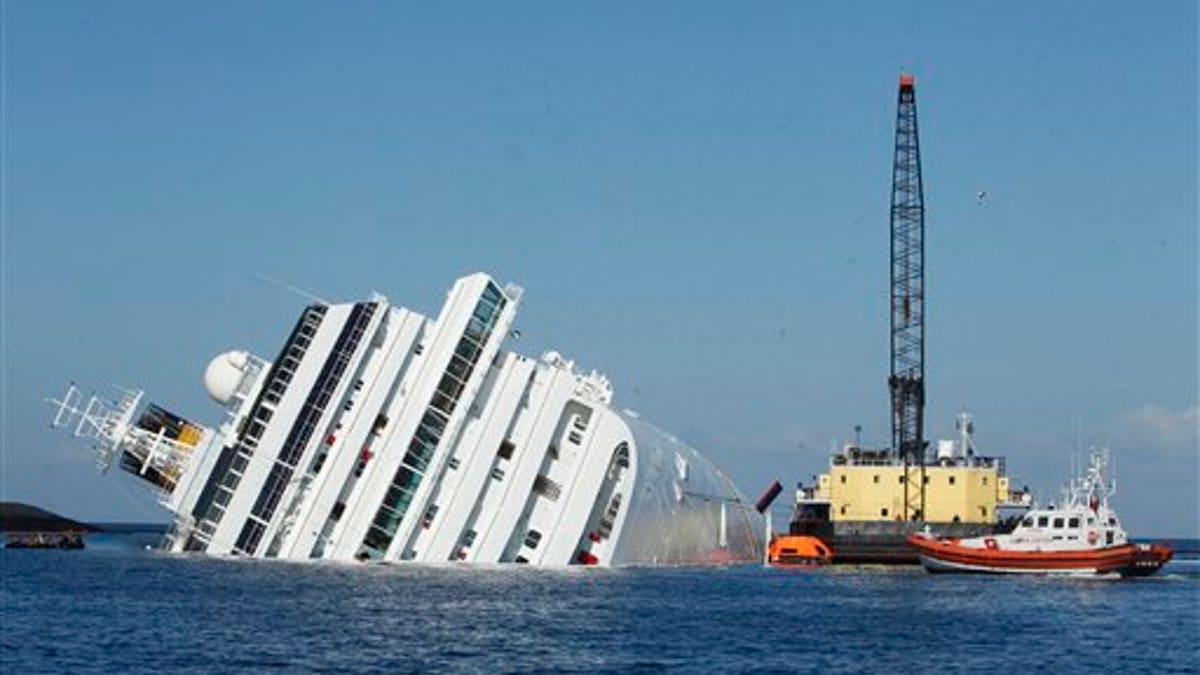
Jan. 24: A sea platform carrying a crane approaches the grounded cruise ship Costa Concordia off the Tuscan island of Giglio, Italy. (AP)
U.S. citizens who were on the Costa Concordia and want to sue may be lost in the sea of fine print written on the back of their ticket vouchers, according to legal experts.
Marc Bern, a senior partner with the New York-based Napoli Bern Ripka LLP, said he plans to file a single lawsuit on behalf of "a number of injured passengers" in Miami on Friday -- despite the cruise line's offer to pay passengers who have returned home more than $14,000 each in compensation.
Families of passengers killed in the accident and cruise guests who were injured and needed medical treatment on site will "be covered under a separate proposal that will take into account their individual circumstances," the cruise line said in a statement.
But Bern’s civil complaint against Costa Cruises and its operator, Miami-based Carnival Corporation, faces a major legal problem because of where the lawsuit is being filed, according to legal experts. Included in the fine print on the back of each passenger ticket voucher is a clause stating all lawsuits against the cruise liner must be filed in the country where the company is based. The headquarters for Costa Cruises is Genoa, Italy.
"The lawsuit really faces an uphill battle here in Miami, given the fact that the contract is enforceable," Jerry Hamilton, a Miami-based maritime attorney told FoxNews.com. Hamilton said the 120 American passengers on board the Costa Concordia "gave up their right" to where they can file a lawsuit when they boarded the cruise liner Jan. 13 in Civitavecchia, Italy.
"The accident occurred in Italy, the investigation is in Italy, the evidence and witnesses are in Italy and the majority of the passengers are Italian," said Hamilton. "The court will say that this lawsuit belongs in Italy."
But Bern claims the extraordinary nature of the accident off the Tuscan coast – which killed at least 16 people – should make the criteria on the ticket "null and void."
"You don’t expect that when you get on this Costa Concordia ship in Rome that you are about to become the next Titanic," Bern said. "Nobody signed a contract," he continued. "They got their ticket" and in doing so, "agreed to those terms and conditions of which they had no knowledge."
"Nobody says ‘OK, now before you accept this, read the back of the ticket to make sure you understand how your rights are being limited,'" he said. "I can’t image any are aware of the limitation imposed upon [them] on a ticket," he said. While Hamilton said there is nothing preventing U.S. passengers from filing suit in Italy, he noted that under Italian law there is a cap on the damages.
Other attorneys claim filing a lawsuit in Italy is complicated, and costly for the plaintiffs involved.
Gabrielle D’Alemberte, a senior trial attorney at the Law Offices of Robert L. Parks, P.L., in Coral Gables, Fla., wrote in the Miami Herald that U.S. passengers who survived the crash face a "legal nightmare" in filing suit in Italy.
In the Italian court system, "A plaintiff is required to post a bond of 10 percent of the expected damage award simply to file the lawsuit," D’Alemberte wrote in the Herald. "That means a Costa Concordia passenger who could expect a $2 million damages award, based on similar cases in the United States would need to post $200,000 right at the start and pay an Italian law firm $200,000 to $300,000 in fees over the next four or five years before the case could even go to a jury."
"While the passenger may well prevail in court, based on the reported negligence of the captain and crew, very few people can afford to spend $500,000 or more in a protracted legal battle," wrote D’Alemberte. "That means the U.S. passengers and their families basically have no recourse in this tragedy."
